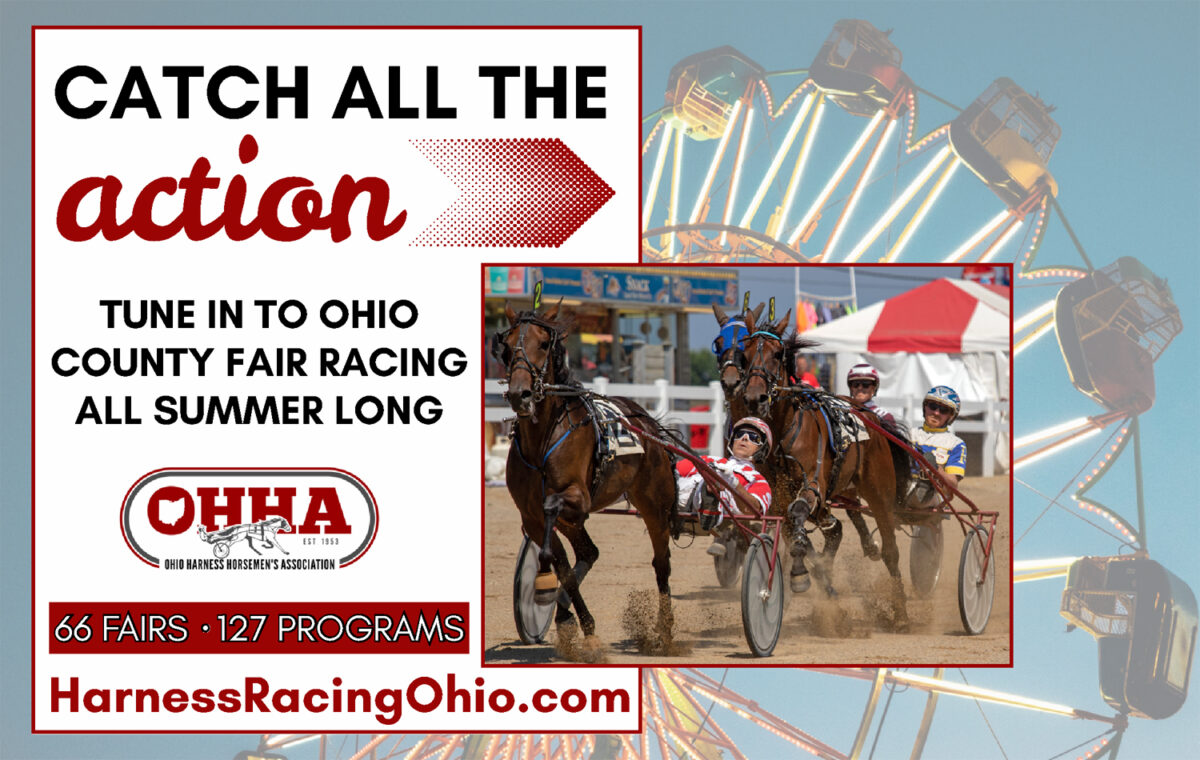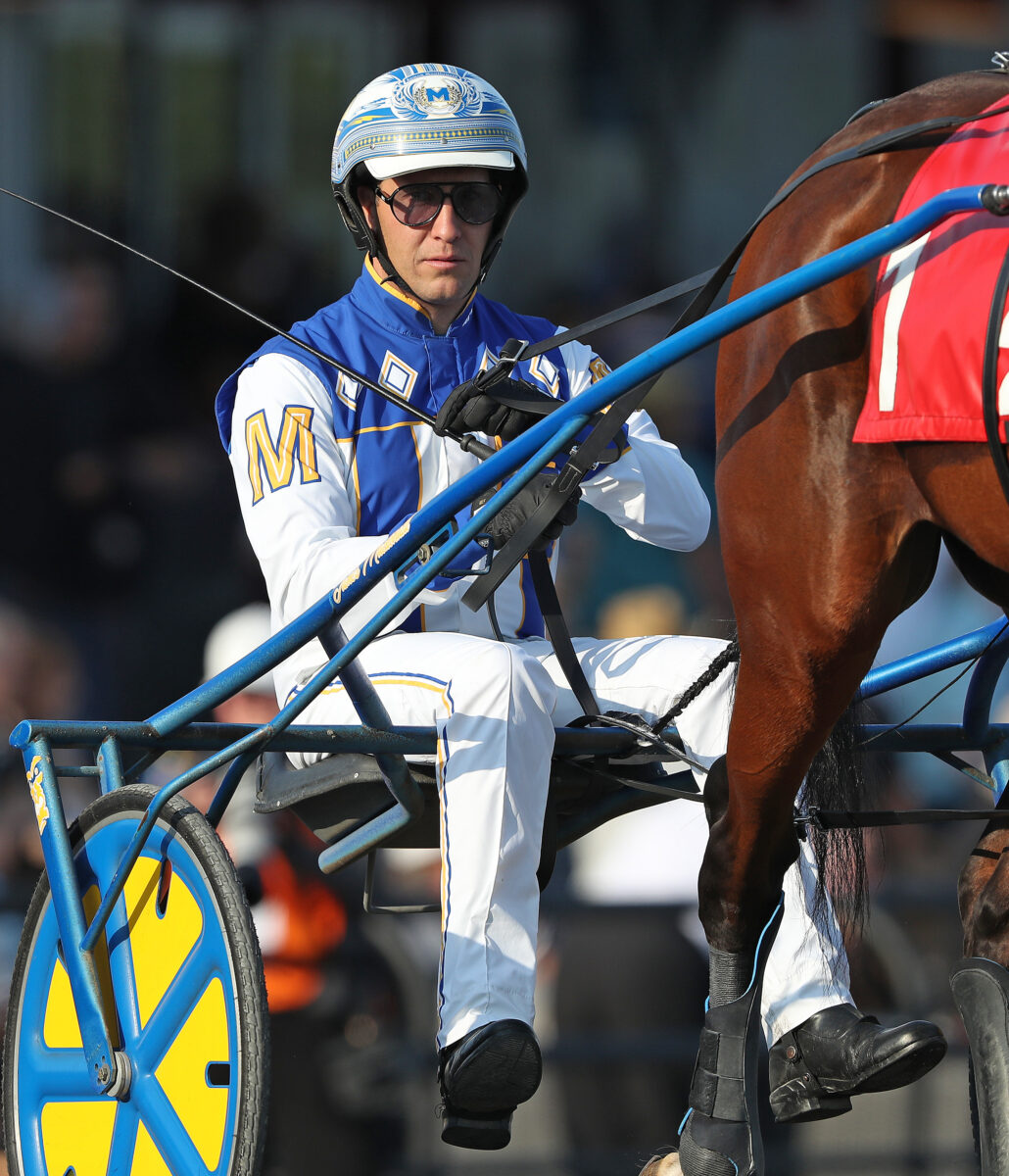It’s not Jim, it’s not Jimmy, it’s James
James MacDonald on being part of one of PEI’s great racing families.
by Murray Brown
James is the youngest — trailing Lloyd, Bobby, Anthony, Mark and Curtis — of the Prince Edward Island MacDonald brothers in age.
“My parents finally got a good one,” said the baby brother with a laugh. “So, they stopped with me.”
James, at the age of 38, is the number one driver in Canada and one of the leaders in all of North America. Unlike his older driving brothers Anthony and Mark who were horse obsessed for as long as he could recall, it wasn’t until he was 18 that James showed any significant interest in harness racing.
“There were a few sports that I much preferred to the horses,” James said. “When I was 18, I went to work for Anthony. He worked me very hard, but over time I learned to love racing and most of all the wonderful creatures that I was destined to make my way in life with.
“I started driving and after a little bit started to have some success. I’ve always been a go with the flow type and generally have taken what life has handed me. I suppose I mostly brought this trait to my driving horses.
“With me, the problem, if you would call it a problem, was to maybe take it too easy with them — to wait on the horses rather than to drive them all hell bent. This has probably proven to be one of my best assets as a driver — especially as a driver of young horses. You can often categorize drivers into two camps, the power drivers and the finesse ones. It’s the ones who are between those extremes that are usually the best.
“The most glaring example of this is the man who I believe to be the greatest to ever sit behind a horse — John Campbell. In almost all instances, he just took what the race gave him and drove the horse according to its strengths. I can say I’ve tried to model my driving around that style and philosophy. I think any success that I’ve had in driving horses is due to my belief in the horse itself, determining how I am going to drive it, rather than any particular driving style.”
It was on the morning of Industry Day at Grand River Racetrack and just two days after the Hambletonian, where James steered Legendary Hanover to a resounding victory in the Cane Pace at The Meadowlands that he and this author engaged in conversation.
Let’s begin with your name. Most people named James, often go with the colloquial Jim or Jimmy. You prefer the perhaps more formal James.
“I was named James. When growing up my brothers would often tease me by calling me Jim or Jimmy. I grew not to like it and asked to be called by my actual name which has since followed me all my life.”
Let’s speak of Saturday’s races and Legendary Hanover. He won in the track and stakes record time of 1.46.2. It appeared to these eyes that there might have been a little extra gas in the tank so to speak. Would you agree?
“There probably was. The question might be, how much? I think at this stage of his career, I’d prefer not to know. It’s still fairly early, both in the racing season and the colt’s career. I do know that he was in tip top condition for the race. For that, all credit needs to go to Tony Beaton and his team and before them to Casie Coleman and her Florida team. They’ve done a fantastic job with him. My main job as I see it, is to take it one step further by not messing up their accomplishments with him. They’ve given me the great privilege of driving one of the best 3-year-olds of this season and who knows how good he can end up being. In the meantime, my preference would be to take it one race at a time and go where the horse decides he wants to take us. His next start is in the Hempt Memorial at Pocono Downs on Aug. 17.”
Your career appears to be on a continual upward trajectory. As this is written, you have 3,761 lifetime wins and your drives have earned $55,820,580 (computed in U.S. dollars). Looking at the year-to-year statistics there was a huge jump between 2020 and 2021. In 2020, your drives earned $3,262,284. In 2021, they earned $6,094,979 – almost double!
“That was the time when COVID was at its worst. I suppose that it could be said that my career benefitted from COVID. Racing was almost shut down here in Canada in 2021. I packed up my whip, my helmet and colors and in effect moved to the States.
“I lived with my brother Mark in Goshen [NY] and began racing at The Meadowlands, Yonkers, Pocono and Chester. It was a really good experience and I got to meet a lot of new people and some big players in the sport. It almost certainly has benefitted me in terms of getting drives from the American people who have sent their horses to race in Canada. It certainly helped my career, but it wasn’t without its negatives. I had to leave my girlfriend at the time and now wife Paige and also my son Griffin for a whole lot longer than I was comfortable with.”
You have moved from being a mostly local driver in Ontario to one who successfully races all over North America. Do you have any favorite places at which to race?
“I suppose the short and smart answer would be the place where I get the best horses to drive. That said, there are many places that I enjoy. A place like Lexington has so much history and is a treat to race at. This past Saturday at The Meadowlands was indescribable. Not only did Legendary Hanover win the Cane Pace, but to race in the Hambletonian and be part of such an amazing day of racing was a pleasure. Especially thrilling was my brother Mark’s win in the $220,000 Sam McKee Memorial with Rocknroll Runa.
“I also love racing at the Jug in Delaware, OH, where I hope Legendary Hanover takes me this year. I suppose if I had to come up with just one place, that place and time, where I guess most Maritimers would say is their favorite, would be Old Home Week in Charlottetown. It’s a place like no other. The only place comparable in the States would be Delaware, OH, during Jug week. It’s so hard to describe. The racing takes over the whole area entirely. All I can say is that every true harness racing fan needs to experience it. If you haven’t been there, you haven’t really experienced harness racing in its entirety and at its best. We won’t be able to be there for the Gold Cup and Saucer this year, but my wife, my son and I will be spending a few days there the week before. I can’t wait.”
You’ve hit the track hard a few times yourself. Your brother Mark has had a few very serious accidents while driving. Does fear play any part in driving horses?
“There is always the possibility of an accident. You need to be very careful while you are out there, but while doing so, you cannot be afraid. There is an old gambler’s saying, ‘Scared money never wins.’ That also applies to driving horses.
“My brother Mark has been seriously hurt several times. I’ve broken a leg and a collarbone. It’s a danger that is always there. But you cannot dwell on it. You need to be as careful as you can, but you cannot let fear overcome you. If it does, you don’t belong on the racetrack.”
Speaking about Mark, how about him? He had two drives at The Meadowlands over Hambletonian weekend. In the first he won the Muscle Hill with Victor Laszlo on Friday. He then came back and won the McKee Memorial on Saturday. I doubt that anyone else has ever done that. Are there any drivers that you’ve tried to pattern yourself after?
“Not really. I mostly try to be myself. But having said that, I think I’ve learned a great deal by watching and racing with other drivers — my brothers Mark and Anthony, John Campbell, Brian Sears, Tim Tetrick, Jody Jamieson, Yannick Gingras and numerous others. I’ve watched them and I like to think I’ve learned from them all.”
Are there any lessons you would pass on to a younger generation of drivers?
“There are many. Here are a couple:
1. Learn by watching and asking. You are never too old or too young to increase your knowledge.
2. In most cases, especially when driving a young horse, it’s important to know who you’re driving for and how they want their horses raced. When a horse is just starting out, most trainers and good horsemen would prefer to have their horses raced conservatively and finishing strong. Take what the race gives you. “In more cases than not, the end result will be better not only with where you finish in the race, but certainly for the long-term benefit of the horse.”


















